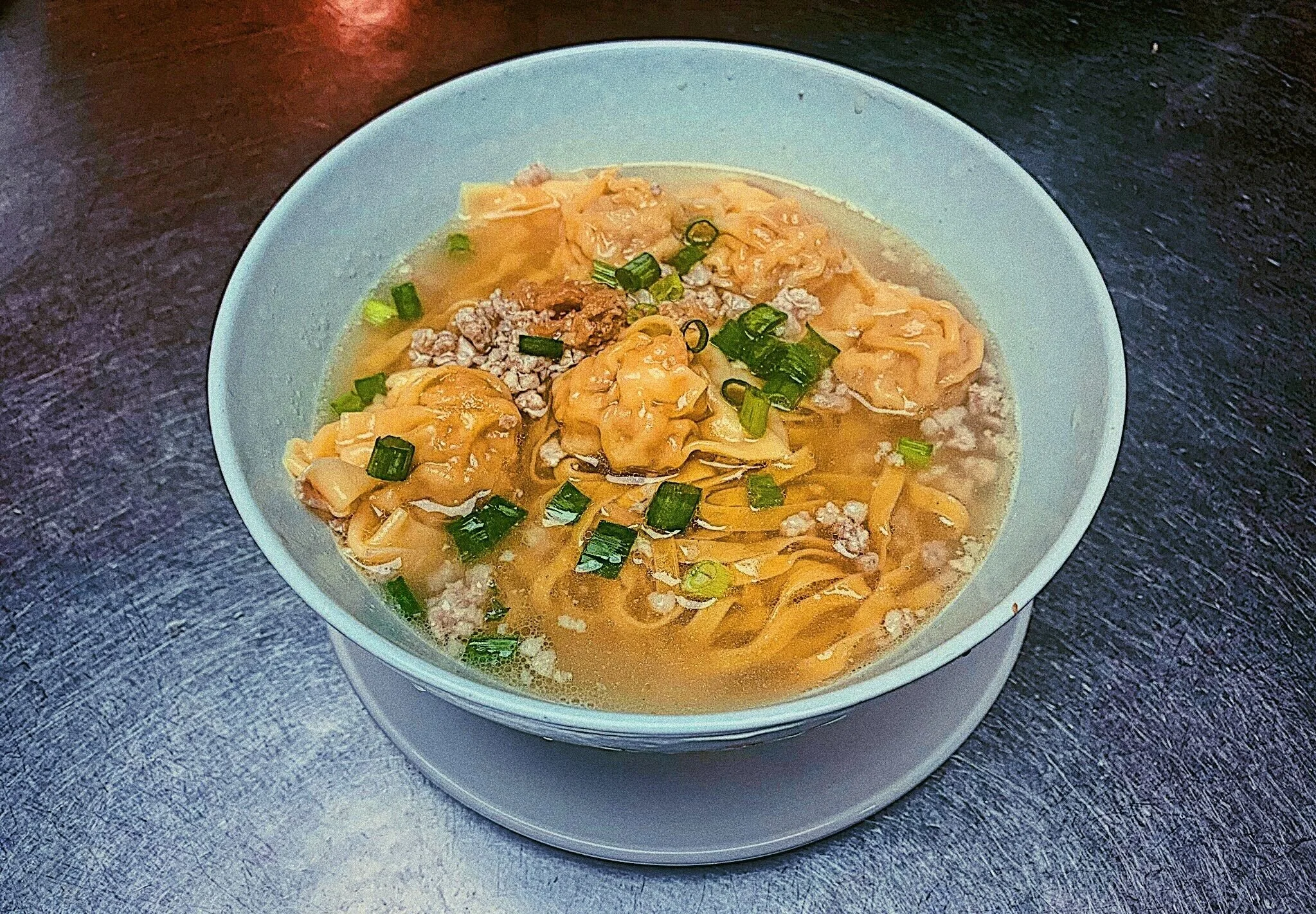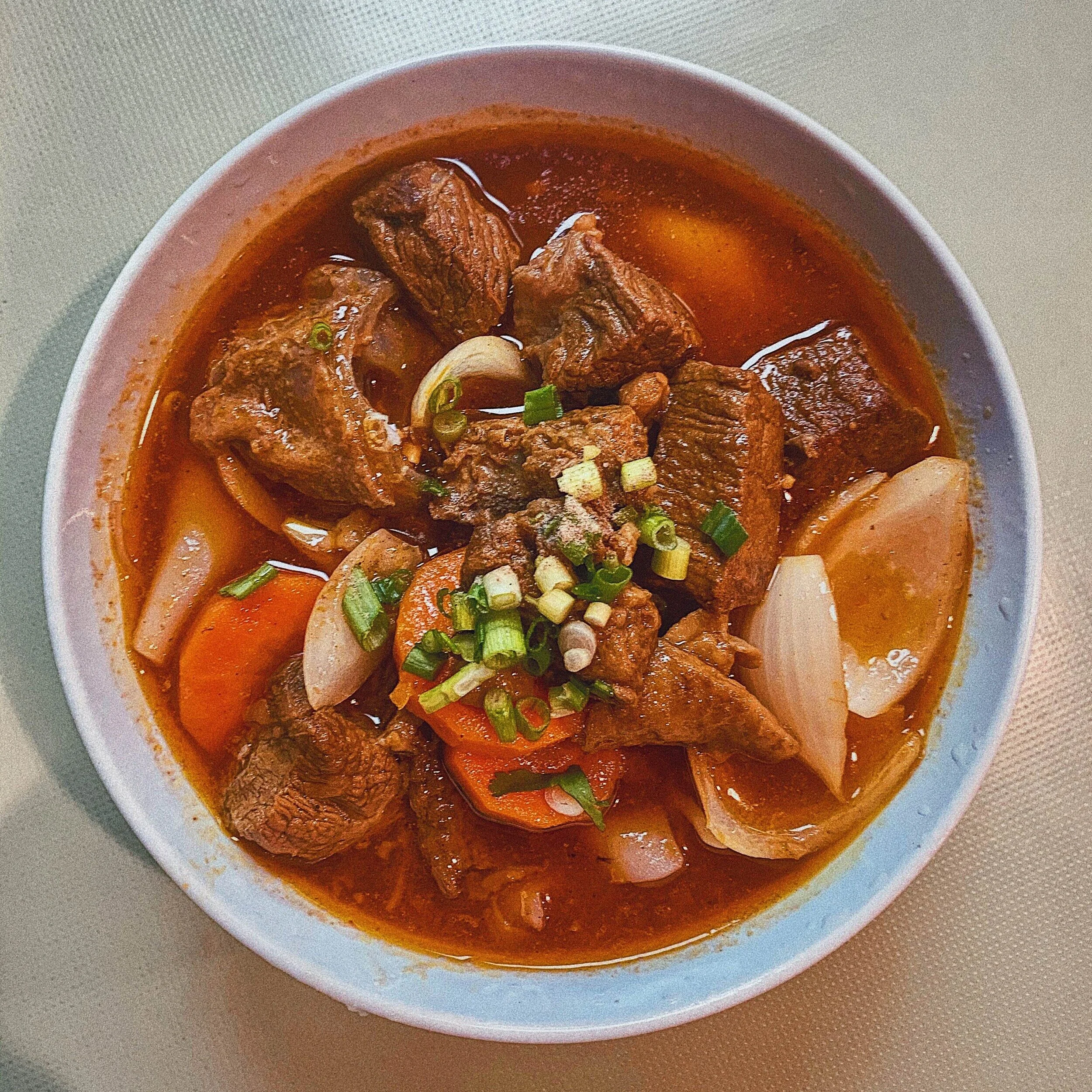New York Bo Ky — A Celebration of Teochew Cuisine
Pork chop with chow mein (flat egg noodle)
Back in September, I got a chance to talk to Mr. Ngo, owner of New York Bo Ky, and his son James for a piece that I wrote for Welcome to Chinatown. I’d never heard of Teochew food before speaking to Mr. Ngo, and I’m so excited to share what I learned about this fascinating and delicious cuisine!
Open since December 2019, New York Bo Ky on Baxter Street is a spin-off of Chinatown’s most well-known Teochew eatery, Bo Ky Restaurant, which has been serving steaming bowls of noodle soup on Bayard Street since 1986. Read on to learn more about what makes Teochew cuisine so unique and what you should definitely order the next time you visit New York Bo Ky!
Tell us about your business and who you are! How long have you been open? What kind of food do you serve? What inspired you to start your restaurant?
Hi! I’m Mr. Ngo, the founder and manager of New York Bo Ky, which is located on Baxter Street. I operated the original Bo Ky Restaurant on Bayard street for a while (after my father passed away) before opening New York Bo Ky as an independent restaurant in December 2019.
My father started the original Bo Ky Restaurant in 1986. While working for other restaurants in New York, after our family first moved here from Thailand, my father noticed that none of the other restaurants in Chinatown offered noodles soups that were unique to Teochew cuisine, so he decided to open his own noodle shop. Teochew, or Chaozhou, is a prefecture in the eastern Guangdong province of China. Over the years, many Teochew people, such as my family, migrated to Southeast Asia, which is where I was born and raised before moving to New York. Though we are ethnically Chinese, our last name, Ngo, is a common Vietnamese surname.
New York Bo Ky primarily serves noodle soup. Our chicken broth is a favorite among customers, though our pork broth is very popular as well. Our dishes are the result of a blending of many different cultures: Chinese, Vietnamese, Cambodian, and some Thai as well. Generations of customers — many of whom have become dear friends — have been enjoying our family’s noodle soups over the past three decades.
What is Teochew cuisine?
Teochew cuisine, also known as “Chaozhou cuisine”, is a very unique cuisine that is known for being very expensive. As such, it is a common cuisine for banquets and special gatherings. Some examples of distinctive Teochew banquet foods include shark fin soup, sea cucumber, birds nest soup, etc. At the end of a Teochew banquet, it’s common to eat a fancy dessert made out of taro paste.
Here, at New York Bo Ky, we do a street food version of Teochew cuisine. You can liken the food that we serve to the burger and hot dogs of American cuisine.
Wonton egg noodle soup
Could you provide a little bit of history about the Teochew people and your family’s immigration story?
The Teochew are people who originated from a prefecture in the eastern Guangdong province of China. Throughout the years and for various reasons, including to escape from civil war, the Teochew migrated to nearby areas such as Hong Kong and Southeast Asia. There is a large population of Teochews all over the world but, whenever we see each other, we all greet each other like family.
As for myself, I am the third generation of ethnically Chinese Teochew born and raised in Vietnam. There were many Teochew in Vietnam when I was growing up, and most were very poor. The majority of them had migrated to the region in search of a better life.
During the Vietnam War, my family and I were part of a group of people known as the Boat People — refugees who escaped from Vietnam to Thailand by boat in the aftermath of the Vietnam War. After the war ended in 1975, we actually stayed in Vietnam for three more years, but it became too difficult for us to make a living. In 1978, we finally left Vietnam by boat and became refugees in Thailand. A few years after that, we came to New York and began working in Chinatown restaurants.
What are some of your favorite dishes to make from your menu? What were your inspirations behind these dishes?
Our beef stew dish is one of our most popular and unique dishes— we stew beef with tomato sauce, which is a combination of French and Vietnamese cooking techniques.
James, my son, loves seafood and is a huge fan of our seafood noodle soup with egg noodles. He says that the dish is so healthy and hearty that it gives him instant energy and helps him get through long days.
Another one of our specialties is our “Country Style Duck”, which is a marinated duck served with vinegar and garlic at room temperature.
Besides those dishes, we are also well known for our cuttlefish balls, beef balls and fish balls, which are handmade here in the restaurant. We also have some unique dishes such as pork tripe, kidney, liver and stomach. Don’t be afraid to give them a try! We cook these using a traditional family recipe, and they are delicious as noodle toppings.
Shrimp rice noodle soup
What is it that sets your restaurant apart from others?
We make “commoner food” that is fast and easy to make. Back before COVID hit, even though we were at full capacity with both indoor dining and takeout, customers didn’t have to wait more than five to ten minutes for their orders. People would come in, eat, and be on their merry way. We were so fast because our food was easy to make, and we had two to three chefs making the noodles at any given time. Almost everything was made fresh in the restaurant every single morning. We even cooked our own chicken and duck!
Unfortunately, right now, since it’s just my family (mostly me and my son, James) working in the kitchen, we don’t have the capacity to make everything by ourselves, but we are still trying our best to serve you the best food possible!
How have you been faring with the impact of COVID? What are some things that you have been doing to stay open?
Things have been difficult, but we are managing. During the first wave, we were forced to shut down the restaurant in compliance with the mandatory stay-at-home orders. We didn’t have enough money to pay our workers, so we had to let go of many of our staff members.
Currently, we are doing outdoor dining and takeout. We also recently brought back indoor dining, but we’re unsure how long that will last given that cases are rising again in NYC and there are rumors that another lockdown is coming. We don’t do any delivery, since most of our customers live around Chinatown and like to stop by in person; we only do a little bit of local delivery by ourselves for some of our closest customers and family friends. It’s those customers and friends who helped spread the word of our grand opening last December and subsequent re-opening after the COVID shut-downs.
We’ve also worked with local grassroots organizations like Welcome to Chinatown to help spread the word that our restaurant is back open for business. The other day, the Fung Bros came in and interviewed us to help us spread the word on social media. We also worked with an organization called Lions Club a couple months ago, and we used our kitchen to help them prepare meals for essential workers for a few weeks.
Beef stew noodle soup
What is one fun fact or something interesting that most people don’t know about you?
I was interviewed by NHK (Nippon Hoso Kyokai, a.k.a. Japan Broadcasting Corporation) back in 1999. They followed me around for two days and put me on national Japanese TV! After the segment aired, even more people were able to learn about our unique food and culture.
How can people support your business?
Come stop by and try some unique Teochew dishes!
New York Bo Ky storefront
Mr. Ngo
*****
Chinatown establishments like New York Bo Ky are what makes the spirit of our neighborhood. We need your support — now more than ever before — to keep that spirit alive. Please consider making a donation to our small business relief fund, The Longevity Fund, or help us spread the word of what’s at stake. Together, we can preserve Chinatown businesses and help say “Chinatown will always be open for business.”





